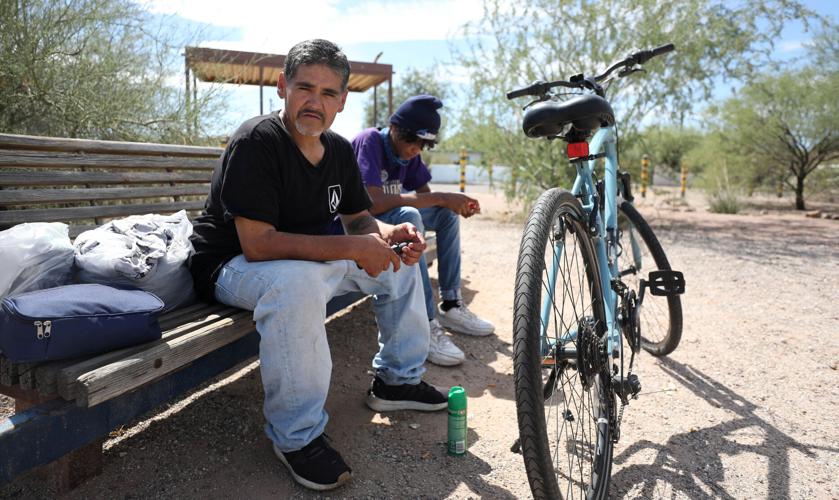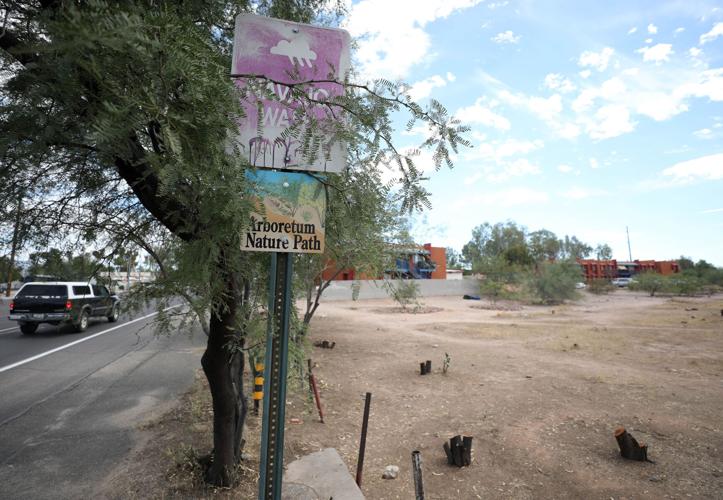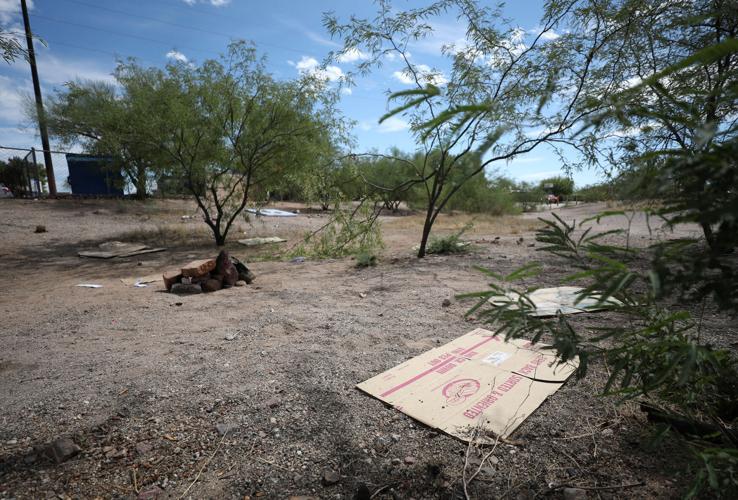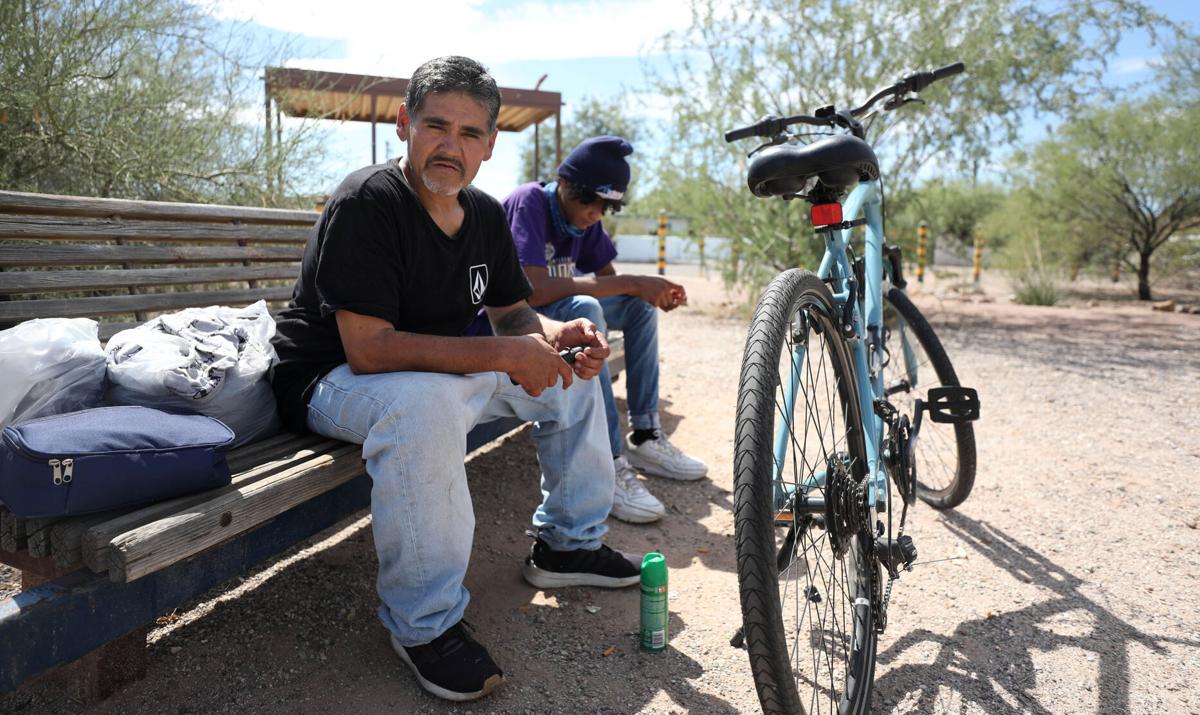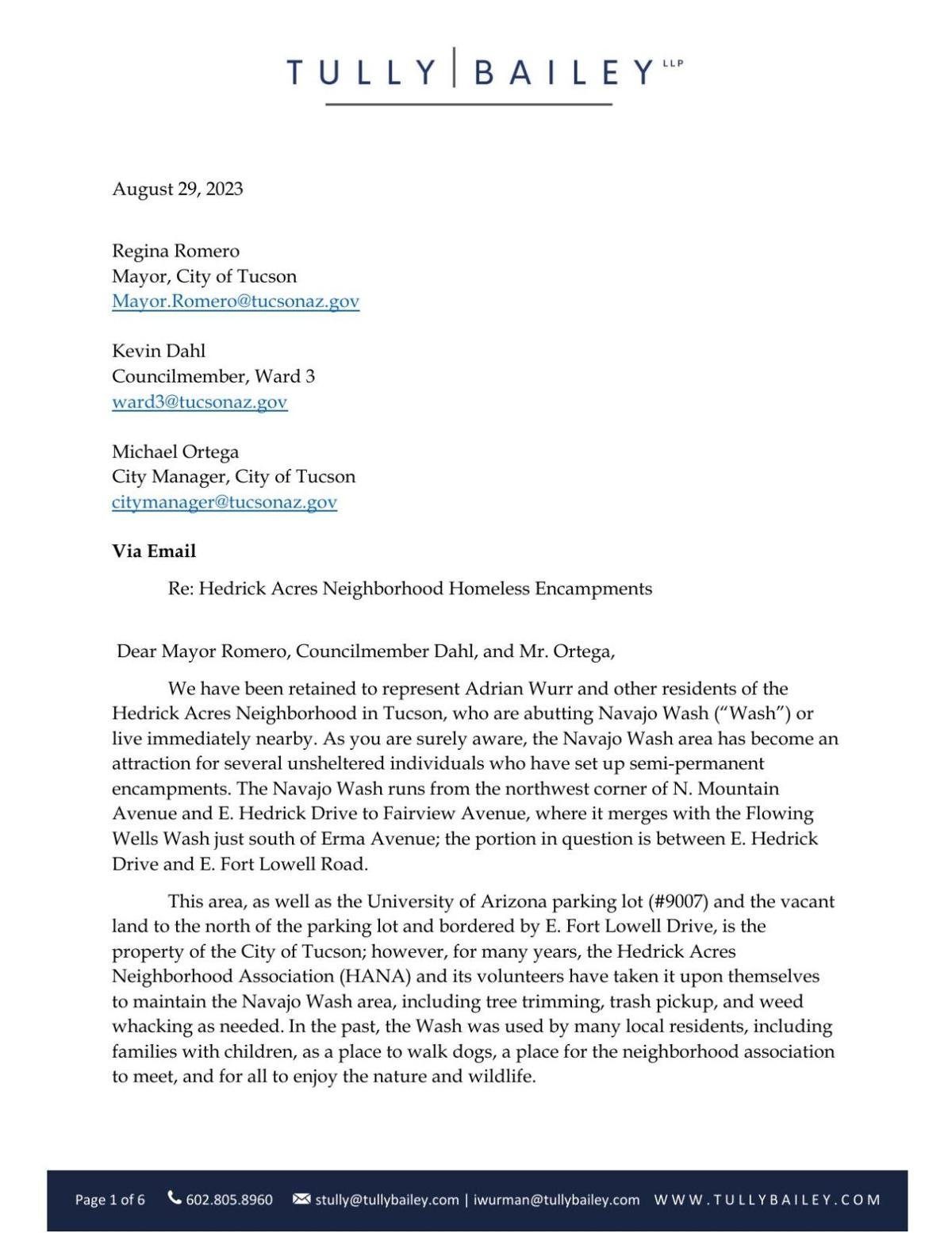The same law firm behind a ruling that led to the clearing out of Phoenix’s largest homeless camp has brought a lawsuit to Tucson.
The Phoenix-based firm, Tully Bailey LLP, is suing Tucson on behalf of residents in the Hedrick Acres neighborhood near East Fort Lowell Road and North Mountain Avenue over a homeless camp at Navajo Wash.
The three plaintiffs — two homeowners and one business owner in the neighborhood — said the area’s been “negatively impacted by the masses of garbage and human waste in Navajo Wash,” according to a complaint filed Wednesday in Pima County Superior Court.
The complaint said fires have burned out of control at the wash at least twice “in the recent past,” while drug use at the camps spills “into alleys and streets and on to private property.”

Navajo Wash Park on East Fort Lowell Road. City Council member Kevin Dahl says of criticism about the city’s handling of a homeless camp in the area: “We’ve met with people out there, we’ve been doing it for months, and the homeless protocol has responded. So what we’re hearing is that we’re not doing what they want us to do, which is arrest them all. It’s not illegal to be there. It’s not illegal to be homeless. People who are doing illegal activity, if police see them, they arrest them.”
The plaintiffs also allege criminal activity has increased, including public indecency, stolen mail and smash-and-grab thefts.
The law firm sent a letter to Mayor Regina Romero, Ward 3 Council Member Kevin Dahl and City Manager Michael Ortega on Aug. 29 outlying the plaintiffs’ concerns and adding “the situation has significantly deteriorated” over the past two months. The firm reminded Tucson of its success in previous rulings in Phoenix and warned “Private individuals such as those in the Hedrick Acres community may bring a suit to enforce the public nuisance laws.”
“The implication was pretty clear that we were willing to file a legal claim if they ignored us, and naturally, they ignored us,” said Ilan Wurman, an attorney for the plaintiffs.
City officials said they have not been served with the lawsuit and cannot yet comment on it.
A Maricopa County Superior Court judge ruled Wednesday afternoon that Phoenix has until Nov. 4 to clear out its largest homeless encampment known as “The Zone.” The ruling comes from a lawsuit Tully Bailey LLP filed in August 2022 that outlined concerns from business owners and residents similar to the new suit over Navajo Wash.
Given the law firm’s success in the state’s largest city, the new lawsuit in Tucson could pose dramatic changes to how Tucson handles its unsheltered population.
While the goal of the lawsuit is to force Tucson to clean up Navajo Wash, Wurman said, “We're hoping to get a court judgment and a court precedent that others can use around Tucson.”
But the massive downtown Phoenix camp in proximity to nonprofits and social service agencies that provide aid to unsheltered people is a stark contrast to what the Navajo Wash Park looks like today.
On Friday morning, the park had significant remnants of trash and drug paraphernalia, but only one person sleeping on a park bench. Later in the afternoon, two men were present at the park.
Homeless camps have sprung up along the entirety of Navajo Wash for years, as the wash stretches beyond Fort Lowell Road and west to Fairview Avenue. However, the city-owned land in question in the lawsuit represents about a 650-foot distance between Hedrick Drive and Fort Lowell Road.
Adrian Wurr, one of the plaintiffs and the secretary of the Hedrick Acres Neighborhood Association, said the number of camps at the wash “fluctuates” from no camps to “as many as 30.” But the last large gathering happened in July before the area was cleared out by city officials, according to Wurr.
Dahl, the council member who represents the ward encompassing the wash, said he’s heard concerns about the homeless population near Hedrick Acres since he took office in December 2021, but has directed residents to use the city’s established homeless protocol.
“We've met with people out there, we've been doing it for months, and the homeless protocol has responded,” he said. “So what we're hearing is that we're not doing what they want us to do, which is arrest them all. It's not illegal to be there. It's not illegal to be homeless. People who are doing illegal activity, if police see them, they arrest them.”

Cardboard boxes and a lone mattress lay inside of Navajo Wash Park on Friday. Two homeowners and one business owner in the neighborhood have filed suit against the city, saying the area’s been “negatively impacted by the masses of garbage and human waste in Navajo Wash.”
Tucson launched a new tier-based system last October for the public to report camps online. Based on the safety and health risks each site poses, the city provides outreach services, cleans up camps and either lets them remain or clears them out.
Wurr reports walking through the area with Mari Vasquez, the multi-agency resource coordinator for Tucson and Pima County, and meeting with Ward 3 representatives. The neighborhood engaged in a letter-writing campaign expressing concerns, he said, but “we generally got no response.”
Wurr said the main drainage ditch at the park once overflowed with trash, causing water to flood halfway up his driveway.
“The neighborhood has been concerned by quality of life and the impact of fires and flooding, the risk of that. When you have homeless, you have structures that obstruct the waterway,” Wurr said.
The central argument in the lawsuit holds Tucson isn’t protected by a Ninth Circuit Court of Appeals ruling in Martin v. City of Boise that said cities can’t criminalize homeless individuals from sleeping on public land if there’s not sufficient shelter space to relocate them.
The annual point-in-time count the Tucson Pima Collaboration to End Homelessness conducts along with other agencies every January found 1,501 people experiencing unsheltered homelessness in 2023. The latest count represents a 300% increase from 2018.
The lawsuit argues there were 1,066 unutilized shelter and supportive housing beds the night of the count, and alleged “Shelter space is available because those who are currently unsheltered are voluntarily so,” making the Boise argument moot.
However, those available beds include a variety of shelters and housing situations with entry requirements exclusive to veterans, family units, domestic violence survivors and other common situations driving homelessness.
And the count of open bed space isn’t exclusive to emergency shelters, as the complaint counts capacity at sites for rapid rehousing, transitional housing, permanent supportive housing and safe havens — all with differing requirements for entry based on one’s specific situation.
It’s unknown how many unsheltered people would meet the various criteria each shelter requires.
Wurman acknowledged these limitations, but said, “The point here is there are beds available, you know, and they can be repurposed … that is a ton (of shelter) for the city to work with and just doesn't give them an excuse to let the public encampment problem fester."
Get your morning recap of today's local news and read the full stories here: tucne.ws/morning.


